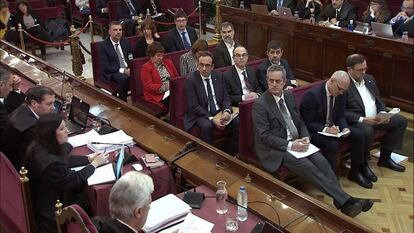Amnesty International calls for release of two Catalan separatist leaders
The rights group says that the Supreme Court trial covering the secessionist drive of October 2017 was not unfair, but that it made an overly broad interpretation of the crime of sedition

Human rights NGO Amnesty International this week released a detailed report on the judgement handed down by Spain’s Supreme Court last month that convicted the leaders of the failed 2017 secession bid in the northeastern Spanish region of Catalonia.
The analysis “did not find any factors suggesting that the trial as a whole was unfair, according to international standards,” said Esteban Beltrán, director of Amnesty Spain.
They should never have been jailed for events that were eminently peaceful
Esteban Beltrán, director of Amnesty Spain
However, the rights group feels that the judges made “an overly broad and dangerous interpretation” of the crime of sedition, resulting in “criminalizing legitimate acts of protest,” according to Adriana Ribas, the Amnesty International coordinator in Catalonia.
The remark refers to the mass gathering outside the building that houses the Catalan economy department on September 20, 2017, which was called in protest at a Civil Guard raid in the building ahead of the outlawed October 1 referendum in the region. “You cannot open the door to criminalizing a series of peaceful protests,” added Beltrán.
Amnesty International is demanding the immediate release of Jordi Sànchez and Jordi Cuixart, the then-presidents of the pro-independence civil society groups National Catalan Assembly and Òmnium Cultural. These two groups called the protest outside the economy department while the court-ordered raid was taking place inside.
Praise from the Catalan government
The Catalan government has made its own assessment of the Amnesty report. While omitting the part that considered the trial fair, authorities underscored the use of the terms “disproportionate,” “restrictive,” “vague” and “dangerous” to describe the court’s interpretation of the crime of sedition. Damià Calvet, the regional chief of territory and sustainability, said that such a report would make him “feel great shame” if he were part of the Spanish justice system. “Our decision is the same: the trial was unfair and so was the ruling.”
“They should never have been jailed for events that were eminently peaceful, as the judgement acknowledges,” said Beltrán.
The organization considers that the nine-year convictions for sedition handed down to Sànchez and Cuixart “violate their rights to freedom of expression and peaceful assembly.” These convictions “must be quashed,” said Daniel Joloy, senior policy advisor at Amnesty International.
The rights group believes that “as private citizens and leaders of civil society organizations, Jordi Sànchez and Jordi Cuixart had a right to express their opinions and to organize peaceful meetings to support the referendum and the independence of Catalonia.
“Even if the purpose of any of these meetings or their actions was to prevent the enforcement of a judicial resolution, peaceful civil disobedience is also protected under international human rights law,” the report adds.
“Bringing overly-harsh charges to acts of civil disobedience unduly restricts the right to peaceful assembly and breaches international law,” the report continues. According to Beltrán, the Supreme Court “failed to demonstrate that the imposition of such severe penalties was proportionate to the peaceful acts of which they were accused.”
Amnesty further finds that that the former members of the Catalan government who were convicted, as well as Catalan parliament speaker Carme Forcadell, “might have committed an offense that could have been legitimately prosecuted,” but that their conviction for sedition is “in breach of the principle of legality according to international standards.”
The organization wants prosecutors to appeal to the Constitutional Court to secure a sentence reduction. This would be a significant shift for the public prosecution, which had been seeking much higher penalties on rebellion charges.
English version by Susana Urra.
Tu suscripción se está usando en otro dispositivo
¿Quieres añadir otro usuario a tu suscripción?
Si continúas leyendo en este dispositivo, no se podrá leer en el otro.
FlechaTu suscripción se está usando en otro dispositivo y solo puedes acceder a EL PAÍS desde un dispositivo a la vez.
Si quieres compartir tu cuenta, cambia tu suscripción a la modalidad Premium, así podrás añadir otro usuario. Cada uno accederá con su propia cuenta de email, lo que os permitirá personalizar vuestra experiencia en EL PAÍS.
¿Tienes una suscripción de empresa? Accede aquí para contratar más cuentas.
En el caso de no saber quién está usando tu cuenta, te recomendamos cambiar tu contraseña aquí.
Si decides continuar compartiendo tu cuenta, este mensaje se mostrará en tu dispositivo y en el de la otra persona que está usando tu cuenta de forma indefinida, afectando a tu experiencia de lectura. Puedes consultar aquí los términos y condiciones de la suscripción digital.








































